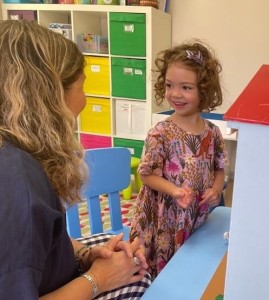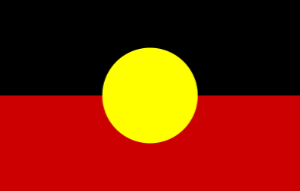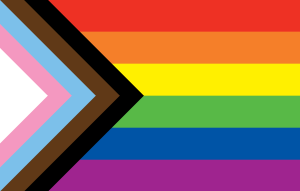Chloe’s Story
Chloe left her first session at the centre, smiling and skipping, ‘like a weight had been lifted.’
Young children often know, think and feel a lot more than they openly share. When they experience the death of their parent or close loved one, it is common for children to keep things to themselves when they feel unsure or vulnerable about facing such intense feelings.
This can mean that the grief of young children is often unrecognised and misunderstood.
The counsellors at the National Centre for Childhood Grief (NCCG) work with children as young as three years old to support them in expressing and managing their grief. Helping children to develop their understanding, coping skills and ability to ‘dip in and out of grief’ at a young age can prepare them for navigating a lifetime of change.
Five-year-old Chloe from Sydney is an active young girl who is full of life and full of joy.
Her devoted parents Jenna and Rocco were together for eight years and surrounded Chloe’s early years with love. Rocco was a teacher of Latin and Ancient Greek and he absolutely adored Chloe. In 2022, Rocco died of suicide when Chloe was three years old.
Explaining death to a child is a daunting topic that unfortunately, is often avoided by people with the well-meaning intention of wanting to protect children from the pain of grief. But avoidance or denial and using vague language such as ‘losing someone’ or ‘passing away’ can be unclear and leave children feeling confused and ignored.
Jenna felt that it was important to be honest with Chloe. She remembers that Chloe seemed to accept her initial explanation that Rocco had died. Chloe would often ask questions about her dad and still bring him up in conversation. She didn’t appear to spend much time crying.
But Jenna could tell there were things she was not sharing. Chloe was grieving, but not expressing everything that she was feeling inside.
It was an immediate concern for Jenna to find the best possible support for Chloe, now that her dad had died. After hearing about the NCCG from a couple of friends and her mother, Jenna felt encouraged to seek support. Jenna knew that she needed guidance from specialist, caring people, to ‘help me learn how to help Chloe navigate her grief’, said Jenna.
Chloe started coming to the centre three months after Rocco died. She attended individual sessions with specialist NCCG Children’s Counsellor Carolyn.
Jenna started to notice that during her waves of grief, Chloe would often be distressed by little changes and want to be near her mum a lot of the time. It is very common for children to crave closeness with their remaining parent at these times.
At her first session at the centre, Jenna vividly remembers how Chloe happily ran off with Carolyn and when returning to Jenna, she was skipping. It was ‘like a weight had been lifted’, Jenna said.
‘She’ll run when she is happy’, said Jenna. ‘It’s an expression of her joy’. Chloe running out of her counselling sessions clearly showed that she was feeling more carefree again. Chloe had been able to express things that had been troubling her and reconnect with her dad.
In counselling sessions for younger children, NCCG counsellors often use play and craft-based strategies. Engaging in activities rather than direct conversations allows children to express what they are feeling inside when there is an absence of the language to describe it.
Carolyn has noticed that in their sessions it has been rare for Chloe to initiate a conversation about her dad, but as they play a game or start drawing, she starts to reveal memories and thoughts about Rocco.
Chloe and Carolyn often play with a doll’s house or puppets to recreate memories she has of living with her dad, while also reflecting on what it is like to live without him. Carolyn encourages Chloe to build memories from things that she can imagine having done with Rocco, even if she can’t distinctly remember them.

Chloe at the NCCG with Children’s Counsellor Carolyn
Chloe makes a lot of craft in her sessions with Carolyn and really enjoys drawing and using stickers. In one activity she decorated some ribbons with words that describe things she loves about her dad to create a ribbon wand. Chloe can now play with this streamer and run around alongside her own memories of her dad.
Jenna can see how proud Chloe is of everything she has made at the centre. The family now keep Chloe’s craft at home to surround them both in memories of Rocco.
Two core values of the NCCG’s care model are truth and inclusion. Being honest, at an age-appropriate level, helps prevent children from wondering or worrying about things that are not true. If children are included in discussions and conversations about their loved one who has died, this maintains and builds their trust with their family and community caregivers and helps prevent them from feeling misled or excluded.
Jenna wanted to talk with Chloe about how Rocco died, but she did not know how to start such a difficult conversation. ‘There is so much stigma around suicide. How do you talk about it in a way that’s not going to make them feel bad?’, said Jenna.
The NCCG’s counsellors provided guidance and examples to Jenna, which she used to explain what suicide means in language that Chloe could understand at her young age.
Jenna and Chloe also attended a session with the NCCG’s Clinical Director, Dr Liz Mann, where Jenna and Liz worked together to explain suicide as another cause of death. Mental illness can affect someone’s ability to take care of themselves but that doesn’t take away the love they feel about others.
Chloe now has access to truthful information in words she can understand. When she is ready, Chloe will be able to ask her own questions about these deeply important and complex matters.
Children that come to the NCCG are given the support they need to manage their grief and to not feel alone or different.
Grief doesn’t have to take over bereaved children’s lives.
Chloe continues to visit her Counsellor Carolyn at the centre every few months. Jenna can see that Chloe is staying engaged in her life and grief is not always stuck in the front of her mind.
Coming to the NCCG has allowed Chloe to express her grief, stay connected with her dad and learn how to build her life around it.
Chloe can continue to smile, and skip, and run around freely.



